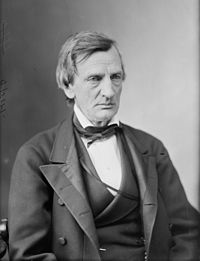William M. Evarts
| William M. Evarts | |
|---|---|
 |
|
| 27th United States Secretary of State | |
|
In office March 12, 1877 – March 7, 1881 |
|
| President |
Rutherford B. Hayes James A. Garfield |
| Preceded by | Hamilton Fish |
| Succeeded by | James G. Blaine |
| 29th United States Attorney General | |
|
In office July 17, 1868 – March 4, 1869 |
|
| President | Andrew Johnson |
| Preceded by | Henry Stanbery |
| Succeeded by | Ebenezer R. Hoar |
|
United States Senator from New York |
|
|
In office March 4, 1885 – March 3, 1891 |
|
| Preceded by | Elbridge G. Lapham |
| Succeeded by | David B. Hill |
| Personal details | |
| Born |
William Maxwell Evarts February 6, 1818 Charlestown, Massachusetts |
| Died | February 28, 1901 (aged 83) New York City, New York |
| Resting place | Ascutney Cemetery, Windsor, Vermont |
| Political party |
Whig Republican |
| Spouse(s) | Helen Minerva Bingham Wardner |
| Alma mater |
Yale College Harvard Law School |
| Profession | Law |
William Maxwell Evarts (February 6, 1818 – February 28, 1901) was an American lawyer and statesman from New York who served as U.S. Secretary of State, U.S. Attorney General and U.S. Senator from New York. He was renowned for his skills as a litigator and was involved in three of the most important causes of American political jurisprudence in his day: the impeachment of a president, the Geneva arbitration and the contests before the electoral commission to settle the presidential election of 1876.
A eulogist summarized his career thus: "Mr. Evarts' most conspicuous, perhaps sole, title to fame is, that he was a great lawyer and brilliant advocate. ... his study of legal principles was profound, his acquaintance with literature was wide, his ideas of professional ethics were exalted. He held great National offices, but his title to them was rather as lawyer than statesman."
William M. Evarts was born on February 6, 1818, in Charlestown, Massachusetts, the son of Jeremiah Evarts and Mehitabel Barnes Sherman. Evarts's father, a native of Vermont, a "lawyer of fair practice and good ability," and later the editor of The Panoplist, a religious journal, and corresponding secretary of the American Board of Commissioners for Foreign Missions (during a time of "fervor in mission propagandism") who led the fight against Indian removals, died when William was thirteen. William's mother was the daughter of Roger Sherman, Connecticut founding father, a signatory to the Declaration of Independence, the Articles of Confederation and the Constitution.
...
Wikipedia
